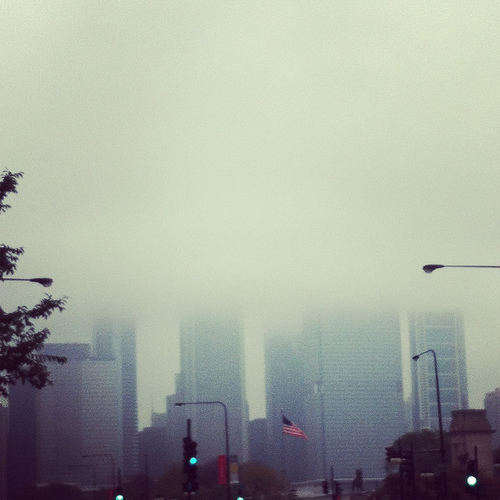
WALK SOFTLY AND CARRY A BIG BIBLIOGRAPHY. OR NOT.
[flickr id=”10459720364″ thumbnail=”medium” overlay=”true” size=”medium group=”” align=”none”]“I touch it, and it goes bzzzzzzarre.”
This is how Kwame Dawes kicked off Creative Nonfiction Week last week at CCC, and it couldn’t have come at a better time. That very morning had been a frigid and foggy one, the kind that meant we were entering a season of grey. Before Dawes reached down to adjust the mic, the entire room in Stage 2, 618 S. Michigan Avenue had been tense with bated breath as the poet, journalist, and all around pundit quietly made his way to the podium.
As an MFA Poetry candidate, I have close ties to the MFA Nonfiction students. We share classrooms, lesson plans, vegan recipes, Netflix accounts, and, this time of year, antihistamines and a variety of herbal teas. Their program is known for blurring the generic distinctions and fostering a more inclusive creative genre, which was especially highlighted in the theme of this year’s CNF Week: Hybrid Forms.
[flickr id=”10459720566″ thumbnail=”medium_640″ overlay=”true” size=”medium_640″ group=”” align=”none”]
I had the opportunity to sit in on a Master Workshop led by Dawes early Monday afternoon. The room was packed with students, both undergraduate and graduate, of journalism, poetry, fiction, and nonfiction. And probably others, if they knew what was good for them. Dawes opened the workshop by reading some poems and moved on to give what I’m inclined to call a poetics or ethics discussion regarding the position of the artist. The responsibility of the poet is a position of empathy, Dawes said. The poet as witness. Dawes briefly dissertated on the chameleonic gesture of the poet as one that strives toward this empathy, how it allows for mutation, for becoming one with the outside world. It is an art of becoming.
Dawes insisted that true empathy requires one to be engaged and disengaged at the same time. To be there, in the moment, and outside of there, too. Dawes made it clear he wasn’t saying it was the poet’s job to give voice to the voiceless, a common and complicated criticism of poetry that could be labeled activist or documentary, but that it was about realizing how those voices are heard. “The poet’s job is to negotiate listening.”
As I’m typing this, I’m sitting at Cafecito, across from school. I’ve had three cups of coffee, and I really, really have to pee. But I don’t want to take a break from thinking about how important of a statement this is.
The poet’s job is to negotiate listening.
Much of Dawes work, both his poetry and journalistic projects, is multimodal and collaborative and involves interviewing Jamaicans who are living with HIV or communities that are trying to rebuild homes in a post-earthquake Haiti.
One student asked about how to deal with the issues of truth and appropriation in art.
When blending in with the world, we are dealing with people’s lives—real lives—and there is much at stake in handling the words and lives of others. But as poets, we have a responsibility to emotional truth, Dawes said. (Here he made the distinction between rendering and reproducing another’s voice.) “Someday we will discover those we write about.”
[flickr id=”10459903963″ thumbnail=”medium_640″ overlay=”true” size=”medium_640″ group=”” align=”none”]
Dawes was also on the docket to give a talk that same evening, one that was open to the public. I was glad to receive the news that my evening literature class, which took place at the same time as the presentation, would be attending Dawes’ evening talk, and so the rest of my cohort would have the chance to experience Dawes in a way almost as intimate as I did.
I would say he walks softly and carries a big bibliography, but only the latter would be true.
Although the accolades of Dawes, the writer, are too numerous to name, the character of Dawes, the person, is extremely charismatic, funny, and devastating. Only Dawes can deftly bury a lead anvil in your chest, making you laugh while he’s doing it. Then he lets the anvil drop. Dawes reminded us between laughs that history, and a violent one at that, is still a part of our present. That there is still something urgent about why we need to connect as human beings.
[flickr id=”10459720204″ thumbnail=”medium_640″ overlay=”true” size=”medium_640″ group=”” align=”none”]
Dawes also shared his knowledge and passion for reggae; of his experience in Nairobi on the day his dear friend and mentor was murdered; of his complete and utter inability to successfully dribble a soccer ball. He spoke on these things, but he also spoke on craft. “Craft is labor. Craft is work,” Dawes said. Following a bit about Dawes’ literary fecundity, when asked by MFA Poetry candidate Matt Sharos to talk a bit about process, Dawes said, “It is as normal for me to take a dump as to write a poem. Staying regular is a good thing. Writing for me is never casual.”
Afterward, I asked my friend Emily—a graduate Nonfiction writer and graphic designer—what she took away from the event, and she summed it up best: “His emphasis on making art from a place that you are moved by—that you can’t write a good poem without being empathetic. And the way his shoulders bobbed as he described reggae being part of the air he breathed in Jamaica. I want to read all of his books.”
